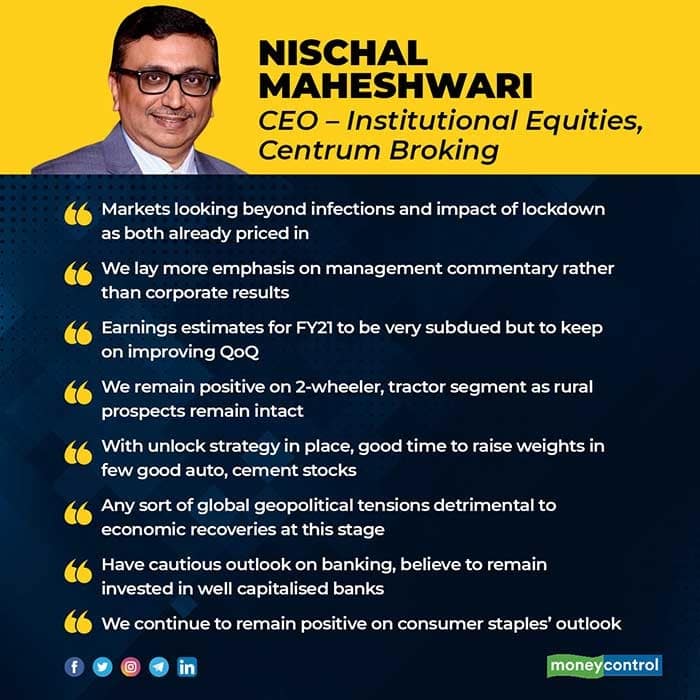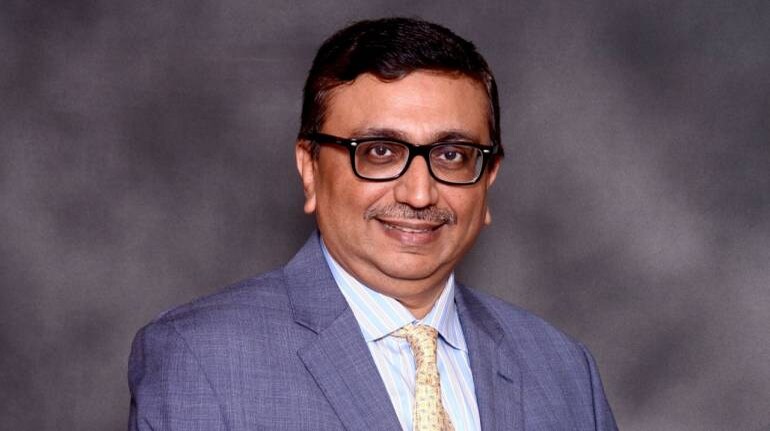"We think after a substantial rally some amount of profit taking is healthy for the market, and the current selling by DIIs is profit booking only," Nischal Maheshwari, CEO – Institutional Equities at Centrum Broking, said.
"Within the auto sector, we remain positive on the 2-wheeler and tractor segment as the rural prospects remain intact given the ongoing surplus rainfall and robust kharif sowing pattern," Nischal Maheshwari, CEO – Institutional Equities at Centrum Broking, said in an interview to Moneycontrol's Sunil Shankar Matkar.
Q: Market rally was so sharp that benchmark indices shot up 50 percent from its March lows and the trend indicated that every dip has been being bought. Are you really convinced with the rally given the rising COVID-19 infections and expected weakness in the economy, OR is the market pricing in something well in advance?
A: The trend has been similar across the globe. Since markets are always forward looking, they corrected significantly in March even before the outbreak turned severe, thereby clearly giving us the reflection of the fact that it was pricing in the disruptions it will cause in the economy. Since the onset of April, investors have been reacting more on "diminishing bad news" and have again started flocking around risky asset classes, thereby pushing global equities higher.
The risk on sentiment has since then regained momentum and this has been highly fuelled by continuous mammoth liquidity injections provided by major central banks across the globe especially Federal Reserve. In addition to this, resumption of global economic activity because of easing lockdown norms have also been driving this rally. Mirroring global markets, even Nifty reversed the trend and recouped much of the losses. Markets are looking beyond the infections and the impact of lockdown as it was already priced in and thus, currently looking at the economic recoveries.
Q: Most experts feel the June quarter earnings so far announced by leaders among sectors are either better or in line with expectations. Do you feel so? What are your thoughts and will the overall earnings trend improve in the coming quarters?

A: Till now, the earnings report cards show that the companies have managed to fare better than expectations or have met expectations. If we look at the quarter, April to mid-May witnessed a significant hit on account of the lockdown where 80 percent activity came to a standstill, which affected businesses substantially. However, with the significant easing of lockdown norms from the last week of May, more than 60 percent activities resumed across the board, thereby resulting in marked uptick in June HFIs and relatively better sales from April and May levels.
IT and cement have been the surprise in the current quarter. The former surprising on the deal wins and the latter by holding on prices, thus posting better-than-expected numbers. Looking beyond the quarter, we will continue to closely examine the evolving macro landscape in regard to supply-demand dynamics and thereby, lay more emphasis on the commentary rather than the results. Given the uncertainty and unprecedented nature of the crisis, we believe earnings estimates for FY21 will be very subdued but will keep on improving QoQ.
Q: Auto sector index with 60 percent rally from March lows outperformed benchmark Nifty50, but sales so far and June quarter earnings are not so good. What is driving the sector and is it just a hope rally?
A: As highlighted above, since markets are forward looking, Nifty auto index is gaining traction from the ongoing recoveries in sales from April-May levels and thereby this index is most likely to shrug off earnings of the June quarter until there is a material deviation from the consensus. The recoveries have been indicated clearly by the monthly sales figures reported by the leading players of the PV, 2-wheeler and tractor segment.
The demand recovery post lifting of the lockdown has been stronger-than-expected across segments excluding CVs and 3-wheelers. This was driven by pent-up demand coupled with the positive rural sentiment. Within this sector, we remain positive on the 2-wheeler and tractor segment as the rural prospects remain intact given the ongoing surplus rainfall and robust kharif sowing pattern.
Q: DIIs so far have been net sellers in July and MFs too. Do you expect the significant fall in inflows into equity funds and SIP to moderate further in July, why?
A: We think after a substantial rally some amount of profit taking is healthy for the market, and the current selling by DIIs is profit booking only. As far as MF flows are concerned, current fall is only temporary as yet Indian retail participation in equities is still less than 5 percent of their total financial assets and is expected to grow substantially from here.
Q: What are key sectors one should consider for his/her portfolio especially after COVID-19 crisis, and why?
A: We will continue to remain defensive in our approach recommending being overweight in sectors like FMCG, IT, pharma and telecom. We continue to closely examine the evolving macro landscape in regard to supply-demand dynamics and assess the ride of various sectors towards normalcy. In our latest strategy report, we have advised our investors to choose operating levered companies over financially leveraged ones, implying that with the unlock strategy in place, it is a good time to increase weights in a few good auto and cement stocks. We are currently equally weighted in these sectors. But, going ahead, if the current trend continues and demand-supply dynamics continue to fare better, then we can increase weights in these sectors. Capital goods/ Infra as a sector should be looked only once the normalcy is attained and urban growth prospects are intact.
Q: What are your thoughts on geopolitical tensions - US-China and also India-China? Will both really hit Indian economic growth or is it just a sentimental effect than fundamental?
A: Any sort of geopolitical tensions across the globe are detrimental to economic recoveries at this stage. The US-China trade war had been already weighing on global trade and growth since its onset but with trade truce announced in November 2019, global prospects were expected to improve in 2020. But, the COVID-19 outbreak arrested the growth and ignited fears of significant plunge in trade and growth dynamics. If the trade war between US-China escalates again, it will definitely weigh heavily on global financial markets and would thereby, delay the global recovery cycle as well. In the case of India-China trade war, banning Chinese applications and forgoing equity FDI from China is unlikely to weigh on the overall FDI equity inflows to India but our dependence on Chinese merchandise imports will take time to ease off.
Q: The banking sector is expected to be hit by asset quality stress once the moratorium gets lifted from September onwards. But, do you really think it is a big concern and as a result one should avoid the complete sector for investment? Also what are your thoughts on NBFC?
A: Asset quality continues to remain one of the key issues for the Indian banking sector. Current moratorium does not help alleviate this pain rather accentuates it. Therefore we have a cautious outlook on the sector and believe to remain invested in the well capitalised banks.
Q: Do you think the demand for consumer staples is back to pre-COVID levels. And is it one of reasons for rally in the market?
A: One sector which has quickly gone back to the pre-COVID levels is consumer staples. By its very nature it is a daily consumption basket which cannot be avoided and therefore is very resilient under stress conditions. We continue to remain positive on its outlook.
Disclaimer: The views and investment tips expressed by investment expert on Moneycontrol.com are his own and not that of the website or its management. Moneycontrol.com advises users to check with certified experts before taking any investment decisions.






